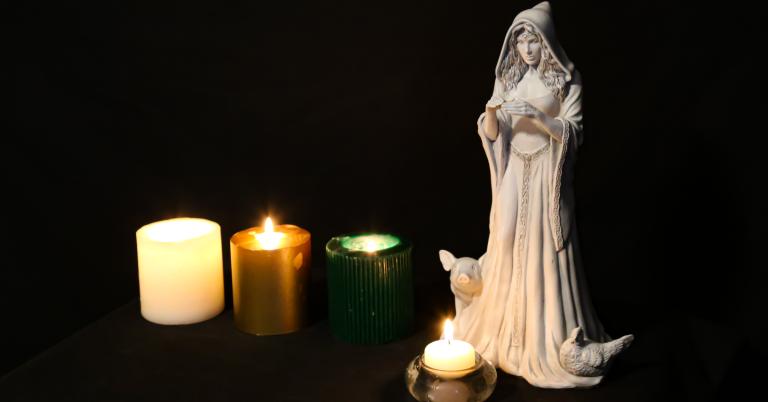I saw a Twitter conversation earlier this week around the question of keeping your spiritual and experiences to yourself. As with so many things I see on Twitter, I can’t say what I want to say in 280 characters, so this turned into a blog post instead.
If you’ve been doing this for very long, you’re familiar with the Witches’ Pyramid: to know, to dare, to will, and to keep silence. Keeping silent about your magical workings allows them to progress undisturbed. And it insures that those who are your enemies or who are simply jealous can’t work countermagic against you.
But magical workings and spiritual experiences are two very different things. The first is a deliberate act of will by the magician. The second is an interaction with immense natural forces and/or Otherworldly spirits that can be facilitated but cannot be commanded.
I’ve written a fair amount about my spiritual experiences over the years, including seeing something with my physical eyes that defied an ordinary materialist explanation. I encourage everyone to talk about their spiritual experiences. Talking about them helps remind us that they’re real, and it reinforces others who are doubting their own experiences.
Talking about our spiritual experiences is mostly good and helpful. But there are times when you shouldn’t talk about them.
When the wisdom is only for you
This is the most obvious reason, but it’s one that’s often ignored. If whatever you receive, intuit, or discern during a spiritual experience is only about you or only for you, then it’s best to keep it to yourself. If you share it, others may feel like they should follow your lead even though what you learned doesn’t apply to them.
This is especially true if you’ve experienced a God first-hand. Our mainstream culture largely thinks of “God” as one and looks at divine revelation as being applicable to everyone universally. People often bring those expectations into Paganism and even into polytheism. They don’t understand that different Gods call different people to work with and for Them in different ways. What’s good and necessary for you may be unimportant or even harmful for someone else.
To limit misunderstandings, if it’s only for you, then it’s best to keep it to yourself.
When you’re not sure what you experienced
This is another situation that should be obvious but often isn’t. If you’re not sure what you experienced (or at least, if you don’t have a high level of confidence in your interpretation – true certainty is difficult if not impossible to achieve) then you shouldn’t be talking about it.
I’ve had people tell me they had a first-hand experience of the Morrigan, but what they describe bears little resemblance to my experiences or the experiences of other Morrigan devotees. Their experience is still real, but I suspect they’ve misinterpreted it… which they would know if they spent more time in discernment and less time talking about it.
If you need help figuring out what you experienced, that’s a different thing. By all means, talk about it with your friends, especially those who have some expertise in such matters. But there’s a huge difference between telling a few people “this happened – what do you think it means?” and telling Twitter “this happened and here’s what it means for you.”
When you’re told to keep silent
The many Gods are not big on explanations. They tell you what They want but not why They want it. I trust Them (or at least, I trust the Ones I know) because They’ve never steered me wrong. So when the Morrigan, or Cernunnos, or Someone else tells me “keep this to yourself” I keep it to myself.
Usually I figure out later that I was working on the early stages of something, or I was working on something sensitive. Those needed to be revealed in their own time, not when I wanted to talk about them.
Let’s be clear about this. When a God tells me to keep silent, I keep silent. When an other-than-divine spirit tells me to keep silent, I give it strong consideration and almost always keep my mouth shut.
When another human tells me to keep silent, I’m very skeptical. While oaths of secrecy are sometimes necessary, if someone’s call for silence is accompanied by questionably ethical behavior, I make sure anyone and everyone who needs to know does know.
When sharing it would be misunderstood
Deeply personal experiences are often difficult to communicate. Sometimes they’re simply too intimate to share. Other times they’re ineffable – impossible to describe in words. Initiatory experiences are often like this, whether they’re ritual initiations facilitated by other humans, or the kind of spontaneous and divine initiations facilitated by Gods and spirits.
This also happens when your experience builds on previous experiences. You may be able to describe what happened, but other people won’t have the context to understand and appreciate it.
If you can’t convey the essence of what you experienced, or if there’s a good chance someone will interpret it in a way that will be inaccurate and unhelpful, then it’s best to keep it to yourself.
When sharing it would only serve to boost your ego
Will sharing your experience help others accept the reality of their own experiences? Will it give them information that will be meaningful and helpful to them?
Or will it just make you look like someone important, someone who’s favored by a deity or other spirit?
In most situations, this is less a case of what people share and more a case of how they share it. Does the story center the experience itself? Does it emphasize the wonder of Nature, the might of the Gods, or the efficacy of magic? Or does it emphasize how the storyteller is powerful or connected or otherwise “special”?
If you’ve got a good story to tell, tell it. If you’re trying to feed your ego, just don’t.
When you don’t understand the limits of UPG
Our ecstatic experiences are often referred to as UPG: Unverified Personal Gnosis. That means it can’t be objectively verified. It means it’s personal – it’s something you experienced, not something you shared with other people.
My religious and spiritual experiences are some of the most real things in my life. But other people have no way to be sure that they actually happened, that they happened the way I say they happened, and that they mean what I say they mean.
We simply can’t expect other people to give our UPG the same level of credence that we do.
If it’s important for other people, they’ll get the message in their own time. Gods rarely have only one messenger. If our assignment is to “spread the news” then we have to do it using this-world evidence and reason.
If you don’t understand that other people aren’t going to accept your UPG as absolute truth, just keep it to yourself.
Sharing with peers is different from sharing with the public
I have a small handful of friends and co-religionists who see the world the same way I do, who have had experiences similar to mine, and in some cases, have been physically present during my experiences – or me for theirs. These are my peers – my working group. I trust them and they trust me.
Unless a God tells me to keep silent, I’m going tell them what I experienced. They help validate my interpretations and they are often coworkers when it comes to doing what the experiences inspire me to do. I do the same for them.
But that’s categorically different from blogging about them or talking about them with visitors to a CUUPS circle.
Talking about our experiences is good – unless it’s not
Most times, talking about our religious and spiritual experiences is a good thing. It reminds us that they really happened – it keeps us from rationalizing them away. It reminds other people that their experiences are real too, and that they shouldn’t rationalize them away. And it brings us into conversation with others who can help discern the origin and meaning of our experiences.
I encourage you to talk about your experiences – most times.
But when talking about them would be unhelpful or even counterproductive, then I strongly encourage you to keep them to yourself.





















